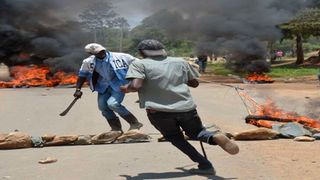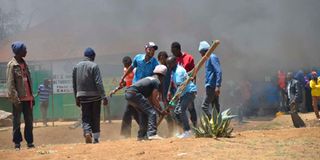
Residents barricade roads in Rumuruti town, Laikipia County, yesterday as farmers clashed with herders over grazing rights in Marura.
| Steve Njuguna | Nation Media GroupCounties
Premium
Guns, land and votes: The unholy alliance of politics and banditry in troubled Rift
If one thing is clear in Rift Valley Regional Commissioner George Natembeya’s mind, it’s that politicians are behind the recent spate of attacks in Laikipia North.
Mr Natembeya, who is in charge of the expansive 14-county region that includes Baringo, West Pokot, Samburu, Elgeyo Marakwet, Turkana and banditry-prone Laikipia, is sure that there is more to the conflict than just a fight over water and pasture.
“The invasion of conservancies and private ranches by illegal herders in Laikipia has nothing to do with looking for pasture and water. The rains are here and there is enough food for livestock in the areas where the herders come from,” he said last week.
“This is just a scapegoat to annex land and displace people. Some politicians are part of the cartel inciting their communities not to move out of the Laikipia nature conservancy and we will arrest them to give us more information.”

Youths armed with clubs and stones protest in Rumuruti town in Laikipia County yesterday amid clashes between herders and farmers over grazing rights.
The tough-talking administrator last week called for the arrest of former Laikipia North MP Mathew Lempurkel and Tiaty MP William Kamket over allegations of fanning violence that has left more than eight people dead and thousands displaced.
The two are out on bail. Mr Natembeya’s claims of a link between banditry and politics adds to a host of similar concerns raised in the past.
The Akiwumi Report, authored by a judicial commission that investigated tribal clashes in the run-up the 2002 polls, concluded that the conflicts between communities “were instigated by unpleasant and inflammatory statements by politicians”.
Initiated violence
The Nation has established that similarly initiated violence has occurred in Kapedo on the boundary of Baringo and Turkana counties and in Mukutani between Tiaty and Baringo South sub-counties.
Ahead of every poll, communal conflicts usually erupt in disputed areas over what are claimed to be feuds over limited water or pasture. These conflicts intensify during political campaigns.
Reports indicate that fighting between the Pokot and Samburu on one side against the Kikuyu in Ol Moran in Laikipia North dates back to colonial times.
“In the game plans of local politicians, territorial gains mean more voters and increased political esteem locally—even though, nationally, those openly endorsing or even tacitly approving such tactics attract vociferous criticism,” concluded Clemens Greiner in a 2013 study titled ‘Guns, land, and votes: Cattle rustling and the politics of boundary (re)making in Northern Kenya’, which examined the role of politics in bandit attacks.
“Nevertheless, given the unpredictability of party affiliations and coalitions, a strong local foothold is the sine qua non for a political career.”
Mr Natembeya told the Nation that some politicians were inciting their people so as to get votes.
Surrender farms
He also accused the leaders of inciting people to air their grievances ahead of elections because they think it’s the best time the government can listen to them. They see violence as a way of getting the government’s attention, hoping that landowners will be asked to leave and surrender their farms.
Attacks that have occurred ahead of elections include the massacre of 42 police officers in Suguta Valley, Samburu County, in November 2012, four months to the March 2013 polls.
In March 2017, just four months to the General Election, armed criminals in Mukutani butchered more than 11 Ilchamus women and children in a suspected retaliatory attack, prompting the government to roll out a massive disarmament campaign.
The genesis of the attack was on March 14, 2017 when two Pokot women were shot dead near Mosuro, in Baringo South Sub-county at 6am.
Armed bandits from the neighbouring community later invaded Mukutani Primary School, where locals from the Ilchamus community were sheltering, prompting the government to evacuate villagers to Eldume, more than 70 kilometres away, where they lived in temporary camps for more than a year.
Two months later, in May 2017, Churo/Amaya MCA Thomas Minito went missing and his body was found four days later floating in the Ol Donyo Sabuk River in Machakos County.
Mr Minito was reportedly approached by three people as he ate lunch at a hotel in Kabarnet. The men produced their identity cards, purporting to be police officers, and demanded that he record a statement at the police station. They whisked him away without showing a warrant of arrest.
In February the same year, Loyamorok MCA Fredrick Cheretei and Tiaty parliamentary aspirant Simon Pepee Kitambaa were shot dead by hooded gunmen at a Marigat nightclub.
A vehicle belonging to Cheretei was also torched and the windscreen of Kitambaa’s car shattered. The attacks have precipitated an arms race amid a proliferation of sophisticated firearms.
Mr Augustine Lokwang, a security and peace expert, said politics has for a long time been a cause of violence.
“There’s a perception that if you use violence to displace people along shared boundaries, you can attract more resources. Once your people occupy areas where people were displaced, the process of land demarcation comes in and they get to have administrative and political units, leading to a county getting an expanded land mass, which is a factor in revenue sharing,” he said.

Youths armed with clubs and stones protest in Rumuruti town in Laikipia County amid clashes between herders and farmers over grazing rights.
The scenario, he added, has led to the formation of several political administrative units that have also become a source of conflict. “In the disputed Kapedo, for instance, there is a ward named Kapedo on the Turkana side, and another on the Baringo side. All these point to politically instigated violence.” Silale Location has two chiefs, one in Turkana East Sub-county and the other in Tiaty Sub-county.
The same holds for the disputed Mukutani, on the boundary of Baringo South and Tiaty. It’s at the centre of perennial fighting between the minority Ilchamus and the Pokot communities.
In pastoral communities, territorial reordering is a dominant theme and demands for boundary adjustments emerge as some of the central levers in these struggles, Mr Greiner found in his 2013 study. Political affiliation has also played a role in addressing insecurity and returning normality to the troubled regions, observes Mr Lokwang.
“If a county is considered to be in the opposition, insecurity challenges are less likely to be addressed. Such areas have been beleaguered politically,” he said.
“Take, for instance, Turkana County, which has been perceived to be an ODM [Orange Democratic Movement] stronghold and has frequently suffered from bandit attacks and cattle raids but has received little attention compared to other regions.”
Insecurity, he said, is perpetrated at multiple levels, ranging from the need to garner political mileage to ethnic interests as political leaders push to have their communities protected (read armed), especially where the government has not done its part to maintain peace.
“You’re tempted to ask: who could be funding these criminals? Where are they getting guns and ammunition? If government systems were working, such issues would be known, but due to politics, they’re swept under the carpet,” he said.
He cited the case of former Tiaty MP Asman Kamama, who once chaired the National Assembly’s Security Committee even as insecurity reigned with his community accused of being the aggressors.
He also linked the violence to politicians who owned large herds of cattle and armed young men to herd the livestock.
National Police Reservists (NPRs), before they were disarmed, he said, had also aggravated the fighting and the government could not account for the amount of ammunition used, and some of it could have ended up in criminals’ hands.
“Imbalances in the recruitment of NPR’s has also drawn criticism from locals, who accuse the government of arming one community against another,” he noted.
This was evident when locals and leaders in Tiaty complained about irregular recruitment of reservists, claiming Tugens and Marakwets had been given more slots than the Pokot, rendering the latter vulnerable to attacks.
More than 450 NPRs had been deployed in insecurity-prone areas in Baringo North, Baringo South and Tiaty sub-counties in 2016. In 2019, leaders in Tiaty urged the national government to vet afresh all reservists recruited in Baringo, Elgeyo Marakwet and Turkana counties.
Some reservists, Kolowa MCA Solomon Makal claimed, used their guns to steal livestock and kill people in Kerio Valley and Kapedo.
The government eventually seized the guns from the reservists on claims that they were carrying out a biometric registration of NPRs all over the country in a bid to weed out rogue officers. The guns are yet to be returned.
Mr Lokwang said that in the absence of effective and accessible security in these areas, small arms are naturally seen as a guarantor of security.
Mr Natembeya recently suggested that those who own guns are poor young men funded by prominent politicians in the region for their own vested interests.





